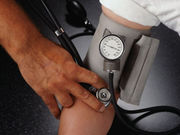Multivariable pattern was identified in training sample; predicts systolic and diastolic BP reactivity
WEDNESDAY, Aug. 23, 2017 (HealthDay News) — A multivariate pattern of stressor-evoked brain activity can predict individual differences in blood pressure (BP) reactivity, according to a study published online Aug. 23 in the Journal of the American Heart Association.
Peter J. Gianaros, Ph.D., from the University of Pittsburgh, and colleagues enrolled 310 community-dwelling adults who underwent functional magnetic resonance imaging with concurrent BP monitoring while completing a standardized battery of stressor tasks. The authors sought to examine whether a pattern of stressor-evoked brain activity could reliably predict individual differences in BP reactivity.
The researchers found that the battery evoked an increase in systolic and diastolic BP relative to a non-stressor baseline period across individuals. In a training subsample (206 participants), a multivariate pattern of stressor-evoked functional magnetic resonance imaging activity was identified using cross-validation and machine learning approaches, including dimensionality reduction and linear shrinkage models. In an independent subsample used for testing and replication (104 individuals), this pattern reliably predicted both systolic and diastolic BP reactivity. Brain areas that were strongly predictive included those implicated in psychological stressor processing and cardiovascular responding through autonomic pathways, such as the medial prefrontal cortex, anterior cingulate cortex, and insula.
“A novel multivariate pattern of stressor-evoked brain activity may comprise a phenotype that partly accounts for individual differences in BP reactivity, a stress-related cardiovascular risk factor,” the authors write.
Copyright © 2017 HealthDay. All rights reserved.








